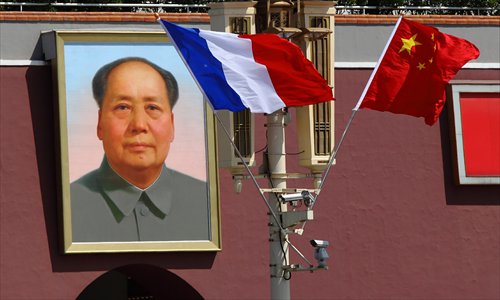$8 billion Airbus deal inked

Chinese President Xi Jinping and visiting French President Francois Hollande pledged to promote a "multi-polar" and more balanced world as Beijing signed a $8 billion agreement with Paris to purchase 60 Airbus planes during the first day of Hollande's China visit.
"China and France both want a multi-polar world. We want there to be a balance. We refuse a world of powers, and of superpowers," the AP quoted Hollande as saying to reporters Thursday after his talks with Xi in Beijing. "When China and France agree on a position, we can drive the world."
Xi said "China and France are both great countries with a strong sense of independence," stressing that the two countries would jointly push for "the democratization of international relations."
On the same day, China also signed a General Terms Agreement with French commercial aircraft builder Airbus to buy 60 of their jets, 42 A320 aircraft and 18 A330s. The $8 billion deal is equivalent to a business contract.
The agreement to buy the 18 A330 was previously put on hold due to a dispute between China and the EU over Brussels's demand that Beijing must be subject to a European airline emission trading scheme. China's airline boom makes it a major market for manufacturers.
China's decision to step up cooperation with European jet-makers can help it avoid the possible risks of over-dependence on a single partner, Shi Yinhong, a professor at the School of International Studies at Renmin University of China, told the Global Times.
The potential market in China will also be increasingly important for French companies that are faced with a shrinking market at home and declining demand in Europe due to the financial crisis," Shi said.
"There is an imbalance in our foreign trade, and we hope to correct that," Hollande said Thursday, according to the AP. "Not by reducing our investment and exports, but by increasing them further, and we will be discussing this throughout our meetings and this trip."
The French trade deficit with China in 2012 hit 26 billion euros, the biggest with any single trade partner, Hollande said.
Hollande also believed his visit to China would help improve employment in France.
"There are over 1 million unemployed." Hollande said, adding that the primary purpose of his trip was to find opportunities for French jobs.
Next year will mark the 10th anniversary of the establishment of China-France strategic partnership and the 50th anniversary of the establishment of their diplomatic ties.
Analysts said both parties should use the opportunities to push their partnership to a new level by expanding their cooperation
France is pushing for a bigger role for developing countries in the international financial system and also supports reforms of the IMF and the World Bank to grant China a bigger voice, according to Shen Jiru, a researcher with the Institute of World Economics and Politics of the Chinese Academy of Social Sciences. He called the visit a chance for the two powers to strengthen their ties.
Shen told the Global Times that as China and France may also coordinate with each other in Africa, "China, a developing country and France, a developed one, can both share with their special experiences of development with African nations." France has often intervened militarily and politically in Francophone West Africa.
But differences over some issues are likely to remain. "France may say what they expect from China on issues like Syria, but China will choose to stick to its own principles," Shi said, noting that this does not pose an obstacle to the overall relationship.
"What they are building is a new type of relationship between a Western power and China that is based upon the idea of seeking common ground while allowing for differences," Shi said.
Wang Xinyuan contributed to this story